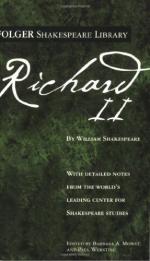|
This section contains 15,144 words (approx. 51 pages at 300 words per page) |

|
SOURCE: “Richard II,” in The Cease of Majesty: A Study of Shakespeare's History Plays, London: Edward Arnold Publishers Ltd, 1961, pp. 225-60.
In the following essay, Reese examines the plot and characterization in Richard II to support the contention that although Bolingbroke's rebellion is wicked, the rebellion itself is a symptom of the kingdom's disease, a sickness that has generated from Richard's complicity in the death of Gloucester and his general inability to effectively rule his kingdom.
Richard II always occupied a special place in the Elizabethan mind. Until he relinquished his crown of thorns to Charles I, he was the archetypal English martyr; no other mediaeval king aroused such compassion for his fate, not even Edward II, who like himself was deposed and cruelly murdered. That he was the last of the Plantagenets, the last direct descendant from the Conqueror, gave him a particular sanctity. The unbroken line...
|
This section contains 15,144 words (approx. 51 pages at 300 words per page) |

|


